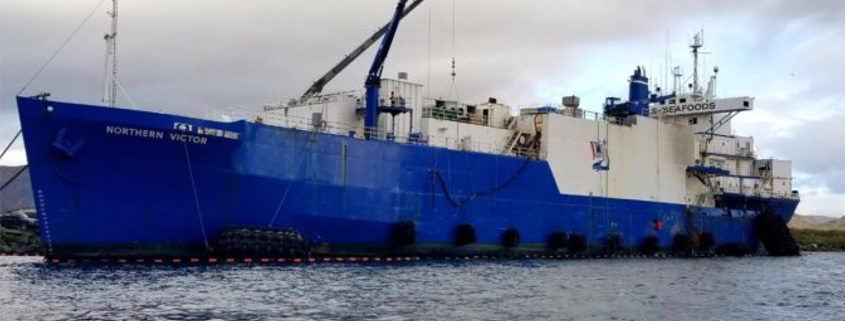Maruha, CDQ groups confirm acquisition of Icicle whitefish assets
Japan’s Maruha Nichiro and two community development quota (CDQ) groups in the US state of Alaska have acquired the whitefish harvesting and processing assets that Canada’s Cooke obtained with its 2016 purchase of Icicle Seafoods.
Maruha Nichiro and its CDQ partners, Coastal Villages Regional Fund (CVRF) and Norton Sound Economic Development Corporation (NSEDC), formally announced the deal on Tuesday, Feb. 1, the prospect of which was first reported by Undercurrent News.
According to a press release from the groups, the deal includes nine fishing vessels and “shared ownership” of 4% of the total Bering Sea pollock quota — thought to be around 60,000 metric tons, the Northern Victor and a “stationary processing plant permanently moored in Dutch Harbor”.
The fleet of catcher boats are part of the Northern Victor Fleet Cooperative, which in 2020, harvested 61,008t of a pollock allocation of 66,018t, according to a public report from the cooperative. The cooperative is made up of 14 vessels landing into the Northern Victor plant, with eight minority-owned by Cooke’s Icicle.
“Maruha-Nichiro is pleased to be able to expand our partnership with NSEDC and Coastal Villages Region Fund. This new opportunity will allow us to enhance the value of service we bring to all our stakeholders: customers, business partners, shareholders, employees and the local communities where we operate,” MarkJoHahnson, president of Westward Seafoods was quoted as saying.
Today marks another milestone in our longstanding pursuit of NSEDC’s vision to increase our ownership in Bering Sea fisheries, from which our company was formed and has built upon to deliver meaningful benefits to our member communities,” Frank Katchatag, NSEDC’s chairman said.
The terms of the sale, which was managed by US seafood-focused advisoryAntarctica Advisors and began in 2020, were not disclosed. Sources previously told Undercurrent that the deal would likely bring a price tag somewhere in the $180million to $200m range.
The two CDQ groups — which use fishing and other revenues to support residents in a swathe of remote coastal Alaskan communities — already have several investments in the Alaska pollock fishery, including one with Maruha Nichiro.
The transaction marks the third major piece of pollock dealmaking in recent months after NSEDCbought a majority position in Glacier Fish Company (GLC) and Trident Seafoods acquired the Starbound factory trawler and two catcher boats from Aleutian Spray Fisheries.
Cooke CEO Glenn Cooke said in a statement made to Undercurrent News that the company chose to exit the pollock business to better serve “customer needs” with a focus on “higher value-added seafood resources such as salmon, sea bass and seabream, crab, scallops and shrimp”.
Cooke promised more seafood dealmaking to come for the company.
“We are targeting more acquisitions to expand our global wild and farmed subsidiaries including launching a new frozen at sea whole shrimp trawler in southern Argentine waters for the 2022 season,” he said.
Maruha’s partnership
Partnering again with the CDQ groups means Maruha Nichiro can overcome US foreign ownership rules in fishing, sources said. As a foreign company, MaruhaNichiro can only own up to 25% of the Northern Victor coop’s vessels and licenses.
There is no limitation on how much foreign companies can own on the land-based processing and sales side, however. So, Maruha Nichiro could control 100% of Northern Victor, which processes the pollock from the coop’s catcher vessels. Canada’s Cooke also directly owns under 25% of the Northern Victor catcher boats, but owns the processing plant outright, sources said.
The deal will deepen the relationship between the Japanese giant, which has over$8 billion in sales and operations around the globe, and the two CDQ groups.
Back in 2011, NSEDC subsidiary Siu Alaska Corp. joined with CVRF to acquire the fishing assets of Seattle-based Wards Cove, using a joint venture named BSAIPartners.
The press release stated that the transaction was carried out by BSAI Ventures, which includes CVRF and NSEDC as joint 75% owners, and Maruha CapitalInvestment, which owns the rest.
According to the most recent NSEDC annual report for 2020, Marua Nichiro is a”minority owner” in BSAI, which owns six pollock trawl catcher vessels and the associated quota. Five of these vessels, the Alaska Rose, Bering Rose, Sea Wolf, Destination, and Great Pacific, “actively participated in the Bering Sea pollock fishery in 2020”, the report states. The vessels are operated by the Alaska Boat Co.
The Alaska Boat vessels fish as part of the Unalaska Fleet Cooperative and deliver their catch to Maruha Nichiro’s Alyeska Seafoods plant in Dutch Harbor. In 2020, the five vessels harvested over 123m pounds of pollock and nearly 900,000 pounds of Pacific cod. The company “had another very profitable year in 2020”, according to the report.
For Tokyo-based Maruha Nichiro, the world’s largest seafood company, the deal would add to its already considerable presence in Alaska pollock at a time when theUS total allowable catch (TAC)
is coming down by close to 240,000t in 2022.
The group, according to its website, boasts a 27% share of the pollock market inNorth America. Companies majority and minority-owned by Maruha Nichiroalready harvest and sell around 300,000t of pollock. Maruha Nichiro’s Alyeska and Westward Seafoods plants process 13.8% of the overall TAC for the fishery, which was around 204,000t in 2021.
As well as the Alyeska and Westward plants, Maruha also owns surimi maker Trans-Ocean Products and Premier Pacific Seafoods, the sales company for PhoenixProcessor Limited Partnership, which operates the Seattle, Washington-based motherships Phoenix and Excellence. Maruha Nichiro owns minority stakes in both vessels, as well as a minority stake in Golden Alaska, a mothership that has 4.1% of the TAC.
Maruha Nichiro also has minority interests in a fleet of catcher vessels landing at its plants via Westward Fishing Co., run by Greg Baker and Marcus Alden. WestwardFishing oversees the administration and operations of five US flag catcher vessels; Alaskan Command, Chelsea K, Pacific Knight, Viking and Westward I.
Maruha Nichiro has been involved in the Alaska seafood space for decades, although this took a notable turn on Dec. 31, 2020. That’s when the Japanese firm unloaded its struggling Peter Pan Seafood Company salmon processing operation to a group of investors including Rodger May of Alaska distributor NorthwestSeafood Company and US private equities McKinley Capital Management and RRGCapital Management. Sources identify ed that group as competing with the Maruha/CDQ interests for the Cooke whitefish assets before the former emerged as the frontrunner.
For Cooke, the sale marks an exit from pollock harvesting, a space it entered with the purchase of Seattle-based Icicle, which described itself as a “miniconglomerate” in the seafood space.
In addition to the whitefish harvesting and processing assets, Icicle brought Atlantic salmon farms in the state of Washington to Cooke, which the company is converting to raise steelhead and sablefish, and several shoreside processing plants focused on Alaska salmon. Cooke spun off the plants in a deal with Seattle-basedOcean Beauty Seafoods to create the Alaska processing venture OBI Seafoods.
Like Maruha Nichiro’s sale of Peter Pan, the OBI deal came as mid-sized Alaskaprocessors have been losing market share amid consolidation in the sector and a fierce rivalry between sector titans Trident Seafoods and Silver Bay Seafoods that has
spurred consolidation and modernization in the space.



